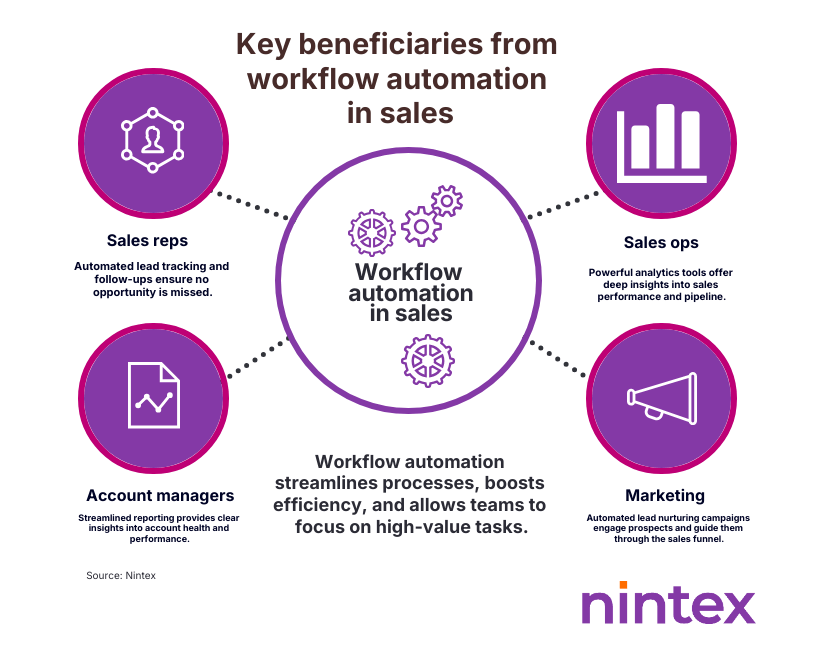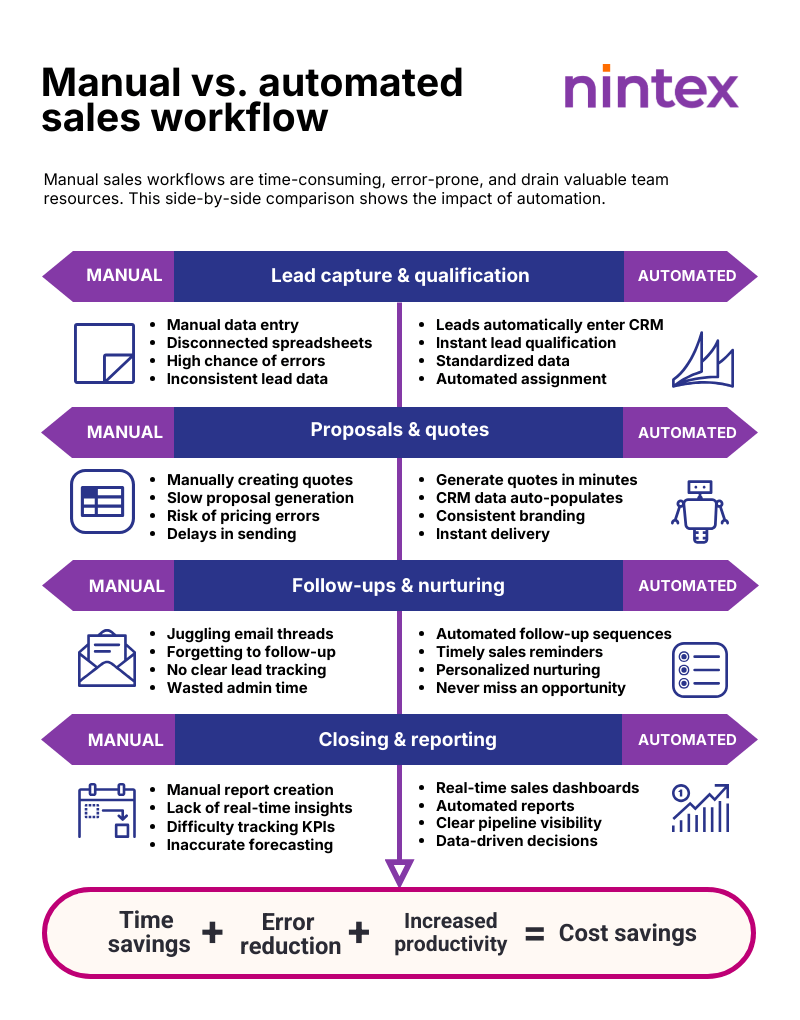In today’s fast-paced business world, sales teams are always searching for ways to streamline their processes and achieve their goals more efficiently. Workflow automation for sales is all about using technology to automate repetitive tasks in the sales cycle, like lead tracking, follow-ups, and data management. This means sales professionals can dedicate more time to building relationships and closing deals. With Nintex, we offer CRM workflow automation solutions that make this transformation possible, empowering sales teams to work smarter and meet their targets effortlessly.
Understanding workflow automation
Workflow automation is the key to automating complex business tasks, allowing for seamless information flow between systems and people without manual intervention. This boosts efficiency and consistency across processes. In sales, automating sales process tasks such as lead generation and document management is crucial. Automated alerts ensure sales reps never miss a lead, and effective communication between sales and marketing teams keeps everyone informed about lead status and customer interactions.
How to automate the sales process involves using tools like workflow management systems and CRM software. These tools help visualize sales processes, manage customer interactions, and ensure smooth data flow across applications. By automating workflows, organizations can focus on strategic decisions and enhance sales performance.

Who benefits from workflow automation in sales?
Workflow automation for sales is a game-changer for businesses of all sizes. Whether you’re a small startup or a large corporation, automating sales process tasks can significantly improve efficiency. Sales teams, from representatives to account managers, benefit by automating lead tracking, follow-up reminders, and reporting, allowing them to focus on closing deals. Sales operations professionals use automation to analyze data and generate insights, while marketing teams automate lead nurturing processes to engage potential customers effectively.
Industries such as technology, finance, healthcare, and retail frequently implement CRM workflow automation solutions. These industries streamline complex sales cycles, compliance checks, patient interactions, and customer engagement through automation. By adopting workflow automation, businesses achieve greater operational efficiency and drive higher sales performance.
The importance of workflow automation for sales
Workflow automation for sales is essential for boosting efficiency and productivity. Automating tasks like data entry and follow-up reminders means sales teams can focus on relationship-building and deal-closing. This reduces human error and accelerates response times, improving overall performance.
Moreover, automated workflows enhance customer experience by ensuring timely communications and personalized interactions. This builds trust and loyalty, leading to higher satisfaction rates and increased sales conversions. Accurate data captured through automation offers valuable insights for strategic decisions, empowering sales teams to meet their targets effectively.

Benefits of workflow automation in sales
Automating sales process tasks offers numerous benefits, including time savings and process optimization. This allows sales teams to focus on high-value activities like client relationships and deal closure, reducing human error and accelerating the sales cycle. Improved collaboration among sales teams is another key advantage, with centralized information fostering teamwork and better sales performance.
Workflow automation also enables scalability and flexibility. As businesses grow, sales processes become more complex, but automation allows teams to scale without sacrificing efficiency. Sales workflows can easily adapt to new products or market segments, ensuring quick responses to changes in demand or strategy.
Examples of workflow automation in sales
In the dynamic world of sales, workflow automation is crucial for streamlining processes and boosting productivity. Automating tasks like lead management and follow-up reminders ensures timely responses and improved conversion rates. For example, a mid-sized technology firm implemented automation to track customer interactions and manage follow-ups, increasing their sales closure rate by 30% within six months.
Nintex offers powerful CRM workflow automation tools that let sales professionals create tailored workflows and gain insights through robust reporting features. By automating sales process tasks with Nintex, organizations can streamline operations and focus on building client relationships and closing deals.
How to implement workflow automation for sales
Implementing workflow automation for sales starts with assessing your team’s needs and identifying repetitive tasks. Gather insights from sales reps about their processes and select tools that integrate seamlessly with your CRM. Nintex provides intuitive tools designed for workflow automation, offering functionalities that meet your sales team’s requirements.
Plan the integration by mapping your current workflows to identify where automation can be most effective. Start small with tasks like lead routing or follow-up emails. Involve your team in this transition, providing training and support to ensure smooth adoption. Regularly review performance against set goals using analytics tools to track automated workflow effectiveness.
Problems and solutions
| Problems | Solutions |
|---|---|
| Repetitive tasks consume valuable time | Automate repetitive tasks to save time |
| Manual errors in data entry | Reduce manual errors with automated data entry |
| Inefficient lead tracking and follow-ups | Streamline lead tracking and follow-ups with alerts |
| Poor communication between sales and marketing teams | Facilitate seamless communication through integrated workflows |
| Difficulty in scaling sales operations | Scale operations efficiently with adaptable workflows |
FAQ
What is workflow automation for sales?
It refers to using technology to automate repetitive tasks like lead tracking and data management, allowing sales teams to focus on relationship-building and deal-closing.
What are the benefits of workflow automation in sales?
Benefits include time savings, process optimization, improved collaboration, scalability, and enhanced data accuracy and insights.
Who can benefit from workflow automation in sales?
Businesses of all sizes, as well as various roles within an organization, including sales teams and marketing professionals.
How can workflow automation improve customer experience?
Automated workflows ensure timely communications, personalized follow-ups, and quick resolutions to inquiries, building trust and loyalty.
What tools are used in workflow automation for sales?
Key tools include workflow management systems and CRM software, which help streamline and optimize sales processes.
